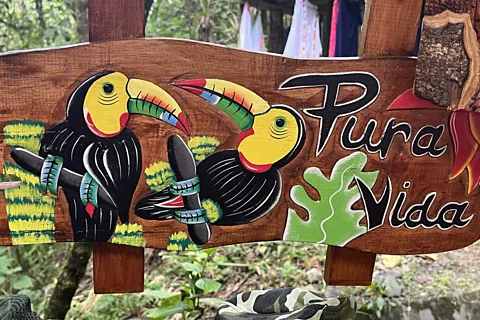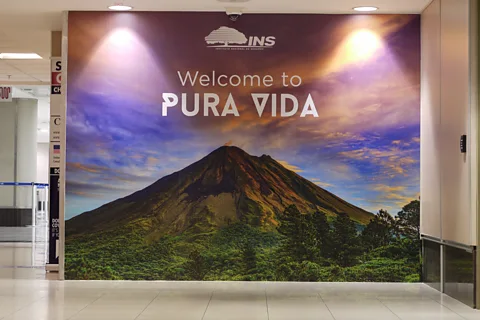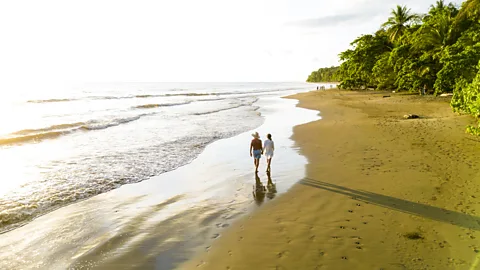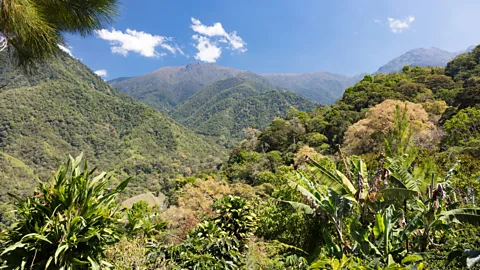Pura Vida: Costa Rica's uniquely positive outlook on life
 Carla Rosch
Carla RoschCosta Rica's national saying "pura vida", which is associated with a sense of wellbeing, positivity and gratitude, is far more than just a simple catchphrase.
If you visit Costa Rica, you will undoubtedly come across the words "pura vida" at some point, whether that's on the colourful hand-painted signs that are ubiquitous across the country or when friendly staff welcome you to any restaurant, hotel or shop. It's so embedded in local culture that in November 2023, the phrase was included in the global Spanish dictionary compiled by the Royal Spanish Academy (RAE) in Madrid for the first time.
In English, "pura vida" can be directly translated as "pure life"; while according to the RAE definition, it can describe a person as nice or friendly or relate to good health. It can also express agreement, describe something as good or serve as a greeting or farewell.
But it is so much more than this: to Costa Ricans, it's a shared identity, a feeling of optimism and a uniquely positive outlook on life.
I grew up surrounded by the phrase, but after nearly five years living in London, I realised that I felt disconnected from its meaning. On a trip back to Costa Rica to visit family and friends, I wanted to rediscover pura vida by finding out what it means to others and see if I could feel it again.
As soon as I arrived at the Juan Santamaria international airport, I was surrounded by it everywhere. There were images covering entire walls welcoming me to the "Pura vida experience"; the words were on screens advertising rental cars and printed on t-shirts, mugs, towels, key chains, and even on the baggage reclaim belt.
Had it become just a marketing tool for tourists, I wondered?
 Matthew Boulton
Matthew BoultonIt's more complex than that, according to Víctor Sánchez, linguistics professor at the University of Costa Rica and president of the Costa Rican Association of Language. He is one of the few academics who has studied the evolution of the phrase locally and was involved in the process to incorporate the phrase into the RAE's dictionary.
"It's absolutely part of the Costa Rican ethos and identity," Sánchez said. It has also become an integral part of the country's tourism "brand". "Foreigners notice it, and then repeat it back, strengthening the way we perceive ourselves," he added.
Sánchez explained that the phrase first arrived in Costa Rica in the 1950s via a Mexican black and white film called Pura Vida. The story starts when the main character, Melquiades, is being kicked out of town because everyone is convinced he brings bad luck. Instead of complaining, however, Melquiades is smiling and grateful, honoured that the town president is there, even if it is to expel him. Melquiades tells the mayor he is "pura vida", a phrase he repeatedly uses throughout the movie to describe people and things. In the film, the phrase conveys a sense of gratitude, that even if you are facing difficulties, you are still alive and can look on the bright side of things.
Years later, another Mexican character used the same phrase in the 1969 cult movie Easy Rider, which resonated with young people. Slowly but surely, the phrase spread across society, growing deep roots in local culture and connecting the population, in a process Sánchez calls "lexical diffusion". He believes the phrase "emigrated" this way to Costa Rica, and stayed because it was well received by a society that had a general positive view of life.
Let's Talk
Let's Talk is a month-long series of language coverage across BBC.com, exploring the ancient roots of alphabets, jargon-busting the modern boardroom, and seeking to understand why we speak the way we do. Browse the whole series here.
Sanchez vividly remembers colleagues using it in the early 1970s amidst a widespread feeling of happiness and optimism. The Vietnam War was still ongoing, and military dictatorships were common in Latin America, but Costa Rica had a stable economy and democracy. "There was a collective imagination at the time that we were a peaceful country with social justice, access to healthcare and an overall good quality of life," he said.
While Costa Rica may now be losing its reputation as a safe and peaceful country – in 2023 the country had the highest number of homicides in its history and is facing growing inequality, increased violence and the deterioration of public services – somehow pura vida persists, and the phrase continues to charm tourists that come to visit.
The small Central American country with a population of just five million regularly welcomes 2-3 million visitors annually. One of these tourists is Erika, who frequently visited Costa Rica from the US while growing up and fell in love with the way of life.
"It was spending time with our tour guide when the meaning of pura vida really hit me. He was always so happy, and saw the positive in things," she said, explaining that he taught her to look at the bigger picture and what is important in life.
However, her most recent trip was not for tourism, but to a rehab centre for substance abuse triggered by her struggles with depression and anxiety.
"In Costa Rica I felt like a different person. Everything there seems simpler, and it changed my mindset. That's what inspired me to go there for treatment, because I wanted to learn more about this outlook on life," she explained.
 Jordan Siemens/Getty Images
Jordan Siemens/Getty ImagesFor some, pura vida feels so important they decide to get inked. When I visited JP Tattoo Company in a calm and quiet part of the capital, San José, Paula Mart, the tattoo artist who co-owns the studio with her husband, greeted me with a big smile. I asked if she has done pura vida tattoos. "Of course! So many I lost count!" she replied, laughing.
It is mostly foreigners who get the tattoo, she told me. "We [Costa Ricans] use pura vida [in a wide variety of ways] but tourists are really drawn to it, and they make it their own," she explained. "I think nature and the good energy here really leave a mark, and they want to keep that experience as a memory on their skin."
It's true that Costa Ricans have a strong attachment to nature, and part of the pura vida philosophy entails cultivating a connection to the Earth. Spending time outdoors is an important part of life here, with many locals frequently visiting beaches, forests, mountains and rivers.
Around the time when the pura vida phrase started spreading, a series of laws and policies were created in Costa Rica to protect forests. The country of 51,100 sq km (less than one third the size of Florida) holds 5% of the world's biodiversity, and more than a quarter of the territory is protected land. In 2021, the Republic of Costa Rica won the Earthshot Prize launched by Prince William for restoring nature.
To see if I could find pura vida in nature, I headed to Chirripó, the country's tallest peak at 3,820m.
After only a few hours of sleep at a nearby hotel, the hike started at 03:30 am. It was still pitch black as we started up the trail and the clear sky made the sparkling stars look unreal. I used them as an excuse to pause and catch my breath. The path through the national park was much harder than I anticipated, but I remembered the advice I'd been given by my friends: to enjoy every step.
 Pavel Tochinsky/Getty Images
Pavel Tochinsky/Getty ImagesAs the sun rose, the forest was so still you could hear a single leaf fall to the ground. I stopped to close my eyes and let the peace envelop me. I felt relaxed just listening to my own breath. Halfway to the basecamp we paused at a small shop for agua dulce (a hot brown cane sugar drink) and a cheese tortilla. As we rested, capuchin monkeys played in the trees, throwing bromelia plants at us.
When we arrived at base camp I met Merlin, a local guide who lives nearby in the countryside. After exchanging our worries about the weather, I asked his views on the saying. "Pura vida is the essence of life. For me, it really defines our culture, our feelings, and lifestyle," he said. "We live in a peaceful country without wars or an army. I think we are a happy culture, always smiling, friendly and trying to be of service to others."
Of course, he was generalising, but I understood his point. As we talked, the sky got darker and it began raining. He said it was a shame because on a clear day you can see both the Atlantic and the Pacific Ocean from the peak.
I kept hoping that by the time we reached the summit the weather would clear up, but it didn't. The wind was strong and cold, and I could barely see a metre ahead. Frustrated, we headed back. Lunch was quiet, the air heavy with disappointment.
Later that afternoon we decided to walk in a different direction, to another landmark called the Crestones, a striking rock formation. As we reached the top, the sun came out and with it the most beautiful and complete rainbow. As I stood there in awe, I understood that life isn't what we imagine or plan. Life isn't perfect, it just is, and there can be beauty in that. I finally remembered that pura vida is about being happy with where you are right now and approaching the world with an unwavering attitude of gratitude.
In the end, I didn't have to go searching for pura vida because it was everywhere on my trip: by the ocean at a friend's wedding, sitting in the garden with my family, shopping at the farmer's market and even at the highest peak on a cloudy day. As Sánchez had said, "Pura vida is a way of living life."
CORRECTION: A previous version of this article incorrectly stated that more than a quarter of Costa Rica is protected as national parks. This has now been fixed.
---
Join more than three million BBC Travel fans by liking us on Facebook, or follow us on Twitter and Instagram.
If you liked this story, sign up for The Essential List newsletter – a handpicked selection of features, videos and can't-miss news delivered to your inbox every Friday.
